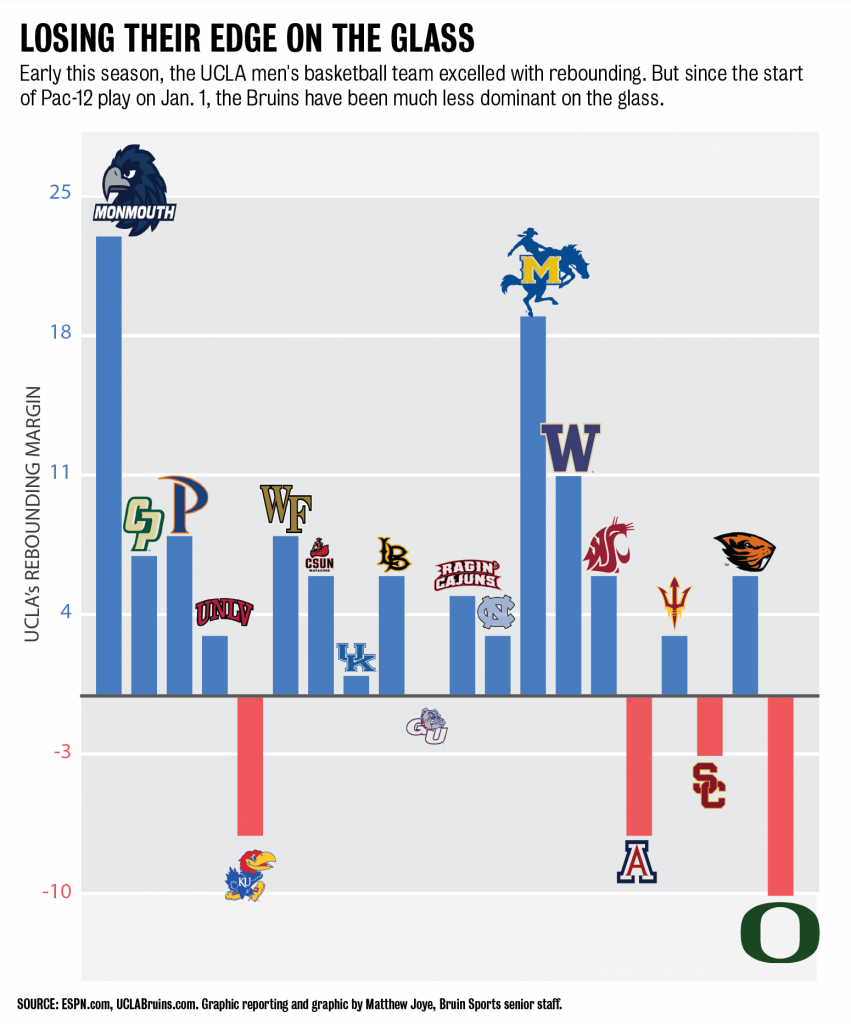The UCLA men’s basketball team looks like it would be one of the best rebounding teams in the Pac-12. The Bruins’ frontcourt is one of the biggest in the conference, featuring a 6-foot-9, 260-pound forward/center and a 7-foot, 245-pound center.
That logic held true early in the season, as rebounding was UCLA’s strength. The Bruins outrebounded all but two of their opponents during nonconference play – No. 4 Kansas and Gonzaga – and their average rebound margin during that stretch was a healthy 6.3.
Ever since the start of Pac-12 play, however, the Bruins (12-8, 3-4 Pac-12) have lost their edge on the glass.
UCLA has been outrebounded in three of its seven conference games. Two of those three games were losses, with the lone win being a three-point decision against Arizona.
The Bruins reached a new low point on Saturday in Eugene, Oregon, as the Ducks outrebounded them by 10. What was more frustrating for coach Steve Alford was UCLA’s inability to box out and prevent offensive rebounds. Oregon swarmed through the paint, collecting 18 offensive boards and 17 second-chance points.
“If we boxed out, I think we would have been a little better off,” said freshman guard Aaron Holiday.
This has been a problem for UCLA more than once. In the Pac-12 opener at Washington on Jan. 1, the Bruins went through a stretch where they allowed seven offensive rebounds in just over three minutes. For context: Arizona State allows 7.9 offensive rebounds per game during conference play.
Then, against Arizona on Jan. 7, UCLA nearly blew a 14-point lead in the second half by once again allowing a slew of offensive rebounds. The Wildcats pulled down seven offensive rebounds in the final 10 minutes of that game, notching eight second-chance points. With all of those additional opportunities, Arizona was able to tie the game in the waning moments.
Overall, UCLA is allowing 14.3 offensive rebounds per game during conference play, which is more than any other Pac-12 team except Washington, which allows 15.4 per game. The Bruins’ average rebound margin during conference play is a meager 0.86 per game.
“When you’re constantly giving up second and third opportunities, it’s demoralizing,” Alford said. “It breaks you down defensively.”
And UCLA can’t afford to break down defensively, as it has proven to be one of the most porous defensive units in the conference.
Forward/center Tony Parker, the team’s lone senior, put the onus on himself to turn things around.
“I have to play better defense as a senior, just to rally the troops and be better to guard (opponents),” Parker said.
With contributing reports by Claire Fahy, Bruin Sports senior staff.


Welsh and Parker play soft and they get no help from the guards or Golman and Bolden on the boards. It doesn’t seem like UCLA has a coach on the staff to help these guys learn how to position themselves around the rim, and they constantly get the ball knocked out of their hands or they get out jumped or outhustled for loose balls under the basket. The teams that dominate them on the board just have better and quicker athletes. The last two losses, Bryce Alford can’t free himself for a shot and when he does he misses. This team is not going anywhere this season. They won’t get selected for the big dance. There are too many better coached teams in the PAC 12, with better records. It is so disappointing for us fans, to have to wait until next year when Leaf and Ball get there. But Alford can’t seem to find a big man in his recruiting that will play tough inside and not get pushed around.